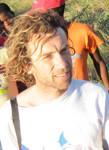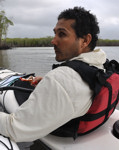 15 days into the trip we arrived to a town named Pebane. A few colonial stone buildings with wrinkles of 40 years of no
maintenance stamped on their face... The rest are small houses made of bamboo, the strong ones are filled with mud.
The central street - another reminder from the colonial period - is a wide boulevard probably planned for the rapid traffic
in the busy center of the town. These days an old truck slowly zigzags between the puddles and holes in the pavement. The silence is then
restored for another half an hour. Nearby the boulevard there is a playing field where the residents play
football. We are surprised to see that one of the players is not black skinned. He is Chinese working for a company that
searches minerals. "You know what?" - he tells me - "I'm not sure whether I want to find here any minerals". "What do you mean? Isn't
it your job and hence your profit?" - I ask him quite confused. "Indeed it is", he replies.
"However if we find the minerals, the industrialization will come right afterwards. The life of the local people will
change. Why should we spoil their happiness?"
15 days into the trip we arrived to a town named Pebane. A few colonial stone buildings with wrinkles of 40 years of no
maintenance stamped on their face... The rest are small houses made of bamboo, the strong ones are filled with mud.
The central street - another reminder from the colonial period - is a wide boulevard probably planned for the rapid traffic
in the busy center of the town. These days an old truck slowly zigzags between the puddles and holes in the pavement. The silence is then
restored for another half an hour. Nearby the boulevard there is a playing field where the residents play
football. We are surprised to see that one of the players is not black skinned. He is Chinese working for a company that
searches minerals. "You know what?" - he tells me - "I'm not sure whether I want to find here any minerals". "What do you mean? Isn't
it your job and hence your profit?" - I ask him quite confused. "Indeed it is", he replies.
"However if we find the minerals, the industrialization will come right afterwards. The life of the local people will
change. Why should we spoil their happiness?"
That's exactly what I was thinking looking at the life of these simple Mozambicans: they are so poor, they live so
simple life, and yet they seem to be much happier than us, the Westerners. They are extremely curious, they dance on the streets, they laugh, they sing,
they tell jokes, they are so welcoming and they are always willing to help. It seems that somehow they retain the simple
joyful nature of a child who lives the current moment, and plans very little for tomorrow. We met so many simple villagers
who wore rags and ate almost nothing but mandioca and yet they used the little money they had to buy a radio. They walked
with the radio then everywhere and danced to the wonderful sounds of Marrabenta.
Could it be that the key for happiness that we desperately search in the woods is just under our own feet?
Misha Hoichman
|
 28 days in the Indian Ocean along the coastline of Mozambique... Well, what is there
to see? Why to go to such a remote place, a place where the locals haven’t seen
any white man before (if I can be considered white...)?
28 days in the Indian Ocean along the coastline of Mozambique... Well, what is there
to see? Why to go to such a remote place, a place where the locals haven’t seen
any white man before (if I can be considered white...)?
I think it gives some proportion
in life. Proportions that we in the Western world have already forgotten.
We do
not need to be rich to be happy. Mozambique is one of the poorest countries in the
world. In many areas of Mozambique people are most of the time hungry. They don't
have money, they don't have a car and all the other things we are used to in the
Western civilization. However, they don't look sad or miserable. On the contrary,
they seem to be happy, smiling and laughing a lot.
For us it was great to see how
happy they where when they had the opportunity to help us taking the kayak from
the water, laughing at the two crazy white men arriving from the sea with waves
that prevent the locals from fishing. We didn't feel as tourists who came to see
a different world but more as exhibits shown to the whole village surrounding us
curiously, wanting to know what are we doing there.
After few days paddling in the
high waves we decided to enter the delta of the Zambezi to avoid the high waves.
In the Zambezi delta we started to wander around, although knowing the exact GPS
coordinates on the imaginary Soviet map from the 70's, but not knowing where exactly
to go. We met two fishermen who helped us find the way to the next village which
was few days ahead.
At that time I felt sick having a stomach ache and wanted to
see a doctor.
Then I thought about the local people. This is their everyday life:
in case they need a doctor they need to walk or paddle for few days to get to the
village where the doctor visits every three weeks.
Youval Nehmadi
|


